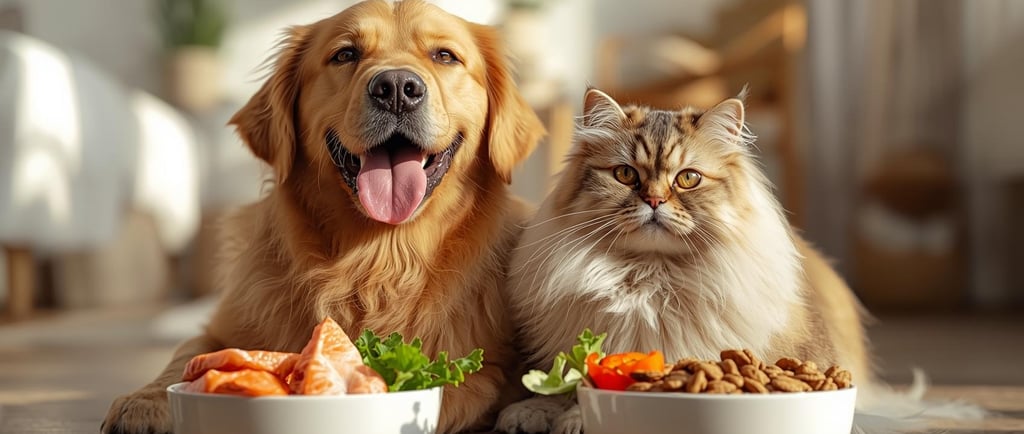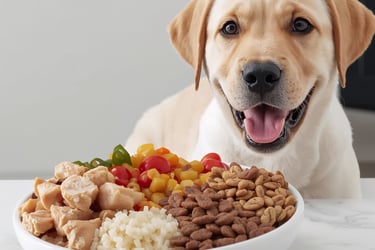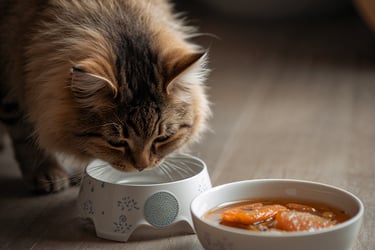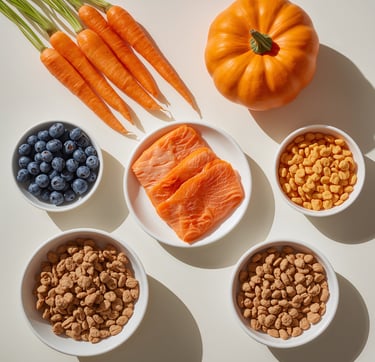Best Diets and Nutrition Tips for Dogs and Cats
Discover the best diets and nutrition tips for dogs and cats to keep your furry friends healthy, energetic, and happy. Learn about balanced meals, healthy proteins, essential fats, and expert feeding advice for long-term pet wellness.
9/26/20252 min read



When it comes to keeping your furry companions healthy and happy, diet plays one of the most important roles. A well-balanced meal provides not only energy but also supports strong immunity, shiny coats, and long-term wellness. Whether you are a new pet parent or an experienced one, understanding the best diets for dogs and cats can make a world of difference in their overall health.
Why Pet Nutrition Matters
Just like humans, dogs and cats require proper nutrients to thrive. The right balance of proteins, fats, carbohydrates, vitamins, and minerals ensures healthy growth, supports strong bones, improves digestion, and boosts immunity. Poor nutrition, on the other hand, may lead to obesity, joint problems, and even chronic illnesses.
Best Diets for Dogs
1. High-Quality Protein Sources
Dogs need protein to build strong muscles and maintain energy levels. Look for diets that include lean meats such as chicken, turkey, beef, lamb, or fish. Avoid foods with too many fillers like corn or soy.
2. Balanced Carbohydrates
Whole grains like brown rice, oats, and barley provide steady energy. For dogs with grain sensitivities, sweet potatoes and peas are great alternatives.
3. Healthy Fats for Skin and Coat
Omega-3 and Omega-6 fatty acids, found in fish oil and flax seed, help maintain shiny coats and healthy skin while reducing inflammation.
4. Portion Control
Overfeeding is a common issue that can cause obesity. Always follow feeding guidelines based on your dog’s weight, age, and activity level.
Best Diets for Cats
1. Protein-Rich Meals
Cats are obligate carnivores, meaning they rely heavily on meat-based proteins. Chicken, turkey, fish, and beef are excellent choices to ensure they get essential amino acids like taurine.
2. Hydration is Key
Cats often don’t drink enough water, which can lead to kidney and urinary problems. Wet cat food or adding broth to dry kibble helps increase hydration.
3. Essential Fats and Oils
Fish oil and poultry fats support brain function, skin health, and coat shine.
4. Avoid Harmful Foods
Chocolate, onions, garlic, grapes, and raisins are toxic to cats. Stick to pet-safe treats and meals designed for feline health.
General Nutrition Tips for Dogs and Cats
Choose vet-recommended brands with natural ingredients.
Avoid artificial flavours, colours, and preservatives.
Stick to consistent feeding times to support good digestion.
Introduce new foods gradually to prevent stomach upsets.
Include pet-safe fruits and vegetables like carrots, blueberries,
and pumpkin as occasional treats.
Final Thoughts
Feeding your pets a balanced and nutritious diet is the foundation for a long, happy, and healthy life. By focusing on high-quality proteins, healthy fats, and proper hydration, you’ll ensure your furry friends have the energy and wellness they deserve. Always consult your veterinarian for personalised advice, especially if your pet has allergies or health concerns.







Connect
Join our community of passionate pet lovers.
Explore
Subscribe
itsalinasir@gmail.com
+92-329-302-9047
© 2025. All rights reserved.
